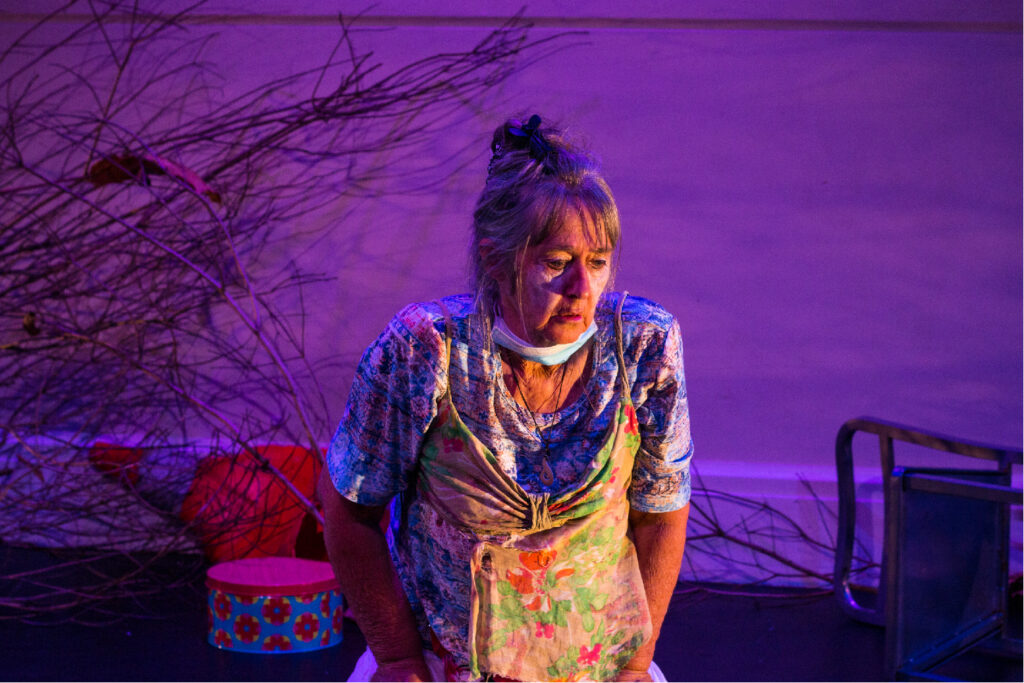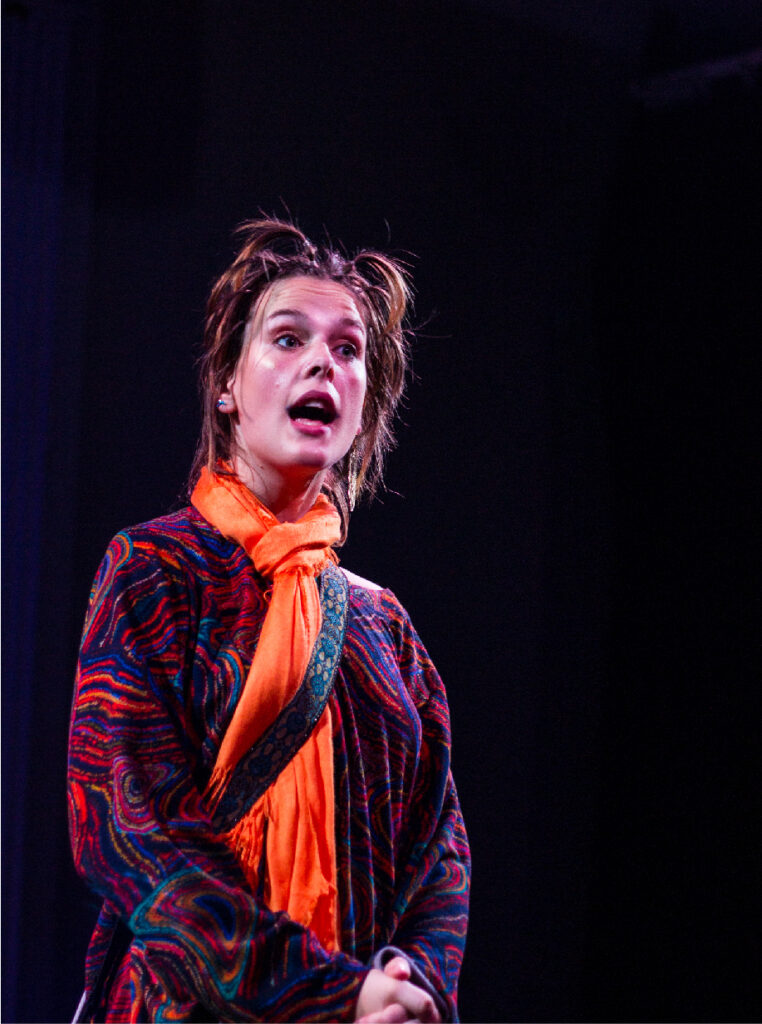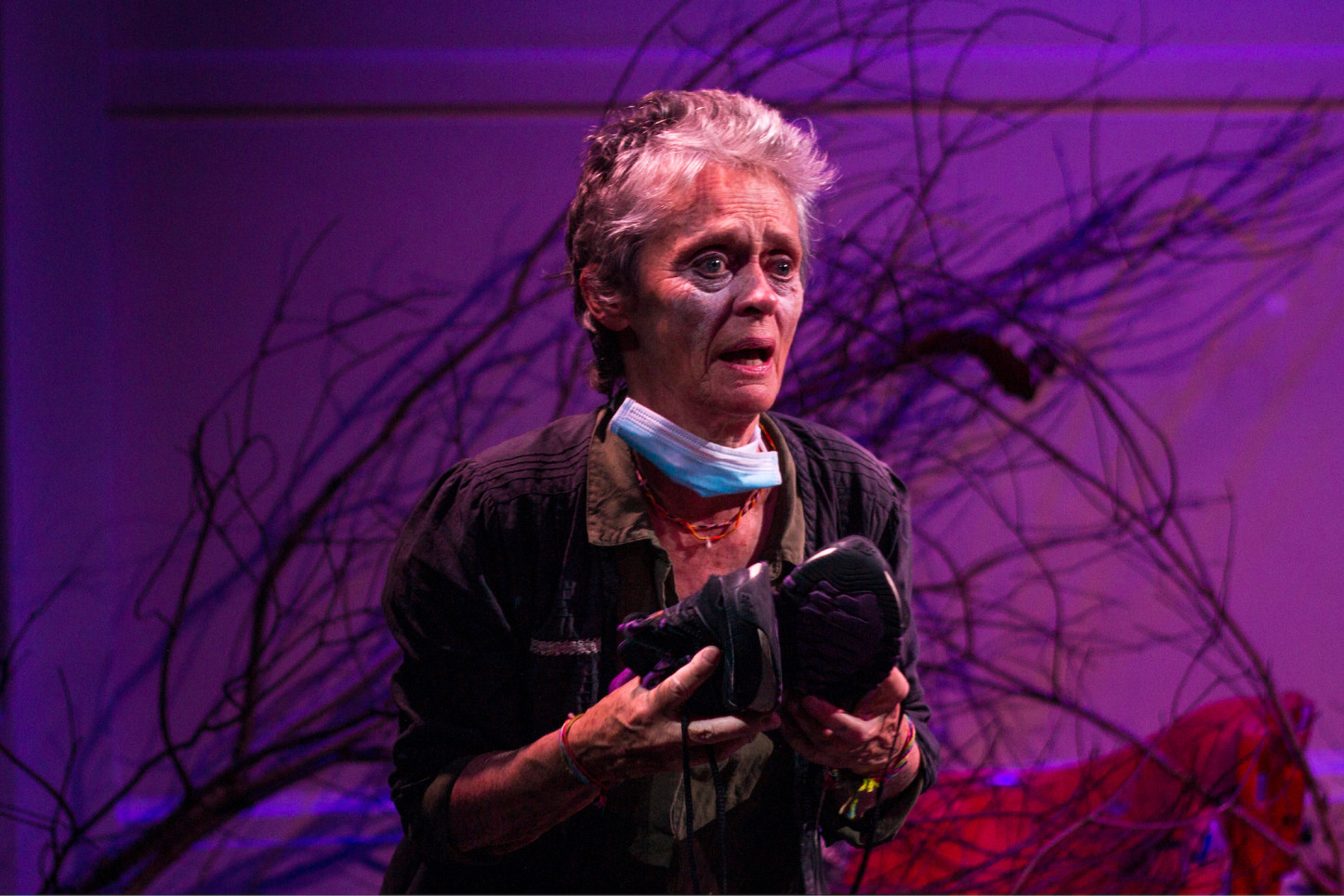This show was absurd. Literally.
According to Absurdism, philosophically speaking, we are all just living our silly little lives each and every day and it’s all basically for nothing. The fact that it’s all for nothing adds to the silliness until we are doom spiralling into pointless absurdity, and trying to find any meaning in it all is futile and frankly impossible.
Huh. Kind of a freeing thought? Perhaps we shouldn’t look for any meaning in life and just embrace its haphazard absurdity in all its chaotic glory.
Or perhaps we can embrace this absurdity to make sense of . . . well, all of it.
That’s precisely what writer Micky Delahunty (they/them) does in Interrupting Cow. This new work by the esteemed playwright is a politically charged existential exploration of the annoyance that continually plagues modern society and the relief that’s just out of reach. Through contrasting character dynamics, the seemingly random importance of a chair, and witty dialogue, the play proposes that perhaps we are doing this to ourselves.
When you first walk into Basement Theatre’s Studio, you are immediately confronted by how bare it is. The only times I’ve seen the studio so stripped back is during pack-ins and outs. The usually curtained back wall is naked, making the often small-feeling studio weirdly spacious and leaving the stage entrance unavoidably visible. The rig is entirely empty above the stage, though there are some cheeky floor units. The set includes dead tree branches, dilapidated traffic cones, old whiteware appliances, a tree stump or two, and turned-over furniture strewn about the edges of the performance space. It evokes a liminal wasteland. There is no hiding or masking any of this with clever shadow either, as the lighting is all clean and clear—everything is fully visible all the time.
Within this wasteland are our Wanderers, played by Micky and sister Catherine Delahunty (she/her), political activist and former Green Party MP. Both are plagued by unrelenting annoyance and dissatisfaction, coping in their own ways. One adamantly adheres to rules that they believe will keep a semblance of order. The other seeks to escape through what the online world has to offer (it turns out for them, it’s mostly cute animal posts on Twitter). They function as foils of each other, leading to bouts of bickering and competition, each perfectly pushing the other’s buttons. While at odds, the show never contends that one is more correct in their pursuit of purpose than the other. Instead, they offer the audience different perspectives when navigating existential dread and how we may be getting in our own way.

There is also the mystical nomadic Bard, played by theatremaker and musician Ari Leason (she/her), who juxtaposes the other’s perturbed states. The Bard is calm, carefree, and, dare I say, even having a good time. They seem to exist outside the realm of annoyance that the others are trapped in, freely travelling in and out of the established liminal space. Yet, they have a fiendish inclination to remind the other two of their perpetual annoyance—I’ve never heard such a beautiful rendition of ‘The Song That Never Ends’.
The Bard introduces the show’s intergenerational nature, which was refreshing to see with women and queer folk. While the Bard appears younger than the others, they take on an almost parental role, deeming when it is suitable to eat cake, resolving fights over issues of sharing and hosting storytime to appease tantrums. This role reversal nods to the show’s examination of ageing in society.
“Micky skillfully asserts that both queer people and older generations exist outside of the hegemonic values of current society and that by simply existing authentically.”
It’s safe to say that there is a lot of annoyance in the world caused by the lack of understanding and empathy between different generations. My favourite scene of the show was when they prodded at this in a back-and-forth between the Bard and the Wanderers. It highlights that while discussions are often about how older generations refuse to understand younger ones, this does, in fact, go both ways. While ideas of gender identity and non-conformity exist outside the traditional norms of society established by older generations, so does ageing. In a culture that highly values youth and able-bodiedness, ageing people are often disregarded the moment they begin to show signs of elderness. Micky skillfully asserts that both queer people and older generations exist outside of the hegemonic values of current society and that by simply existing authentically as a queer person, an older person, or heaven forbid, a queer older person, you are rejecting society’s notions of what is ‘acceptable’.

The show also dives into the politics of wealth, commenting on the housing crisis, issues of class, and the idea of ownership in a capitalist Western society. But because this is an absurdist and surreal piece of theatre, this is done through quarrels over a chair. Despite the Wanderers desperately fighting over who gets the chair and stealing it from one another, when they are both granted a seat, neither wants to give it up or share when they consider the less fortunate (aka the chairless).
The show’s dialogue is witty and quick, leaving me feeling like I’d pick more up on a second or even third viewing. Though, I was surprised by how much the show leaned into the LOL RANDOM XD humour from the early 2010s, despite the title being a reference to the classic Interrupting-MOOOOOOOOOOO-Cow joke. This combination of awkward, and sometimes cringe, humour and the show’s good dose of existentialism reminded me of my danisnotonfire era back in the day (if you know, you know).
The show’s central question of, “Are we in the right place?” which is repeatedly asked by one of the Wanderers, ultimately goes unanswered. While they may be momentarily satiated by a good slice of cake, is it ever really enough to appease us?
Featured photos courtesy of A Mulled Whine.



